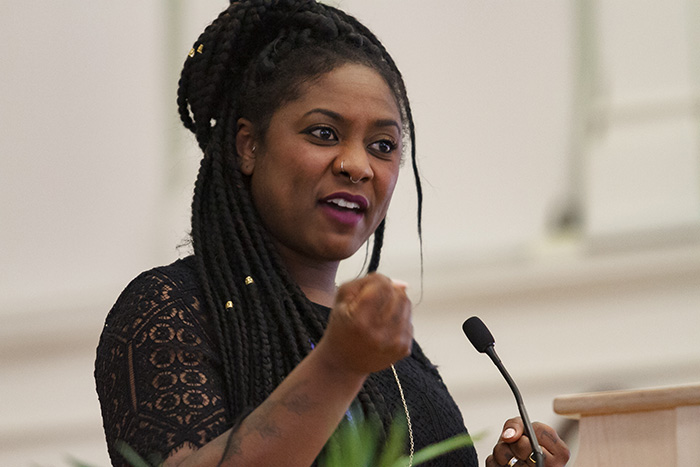'Hashtags don't start movements. People do'

Alicia Garza delivers the keynote address of an Africana studies conference at Dickinson. Photo by Carl Socolow '77.
Black Lives Matter co-founder Alicia Garza delivers stirring keynote address
by MaryAlice Bitts-Jackson
The Black Lives Matter movement found roots on July 13, 2013, after George Zimmerman was acquitted of murder in the killing of Trayvon Martin, an unarmed, African-American 17-year-old. Oakland-based activist and writer Alicia Garza’s disappointment was visceral: She felt as if she’d been punched in the gut. She worried that her younger brother—a gentle, young artist—could face a tragic end one day too.
Garza took to Facebook, crafting a post that included the phrase “black lives matter.” Her friend Patrisse Cullors, a community organizer from Los Angeles, saw it and added a hashtag; as momentum built around that slogan, they involved New York-based activist Opal Tometi in the cause.
Today, the Black Lives Matter movement is at the vanguard of the fight for racial justice, with 39 chapters and counting, all harnessing technology in ways that the civil rights and black liberation leaders of past generations could not have imagined. During her visit to Dickinson, Garza outlined the origins, fundamental principles and growth of the movement she co-leads, noting its place as a continuation of a much older civil rights movement.
Garza’s speech was the keynote address of the Central Pennsylvania Consortium's Africana Studies conference, hosted April 9 at Dickinson, which explored ways that activists use social media and digital narratives to network, organize, speak up and influence. No one can attest more strongly to the powers of social media than Garza, whose viral phrase inspired protests across the U.S., but as she stressed during her speech, a hashtag alone does not a social movement make.
"Hashtags are things that live online, while movements are comprised of people who share a vision, have values and goals, who decide they want to work in concert with each other,” Garza said, speaking to a large audience in Allison Great Hall. “Hashtags don't start movements. People do."
That assertion arrived at an interesting moment in the movement’s brief history. After its explosion online, in the media and in public consciousness, Garza’s phrase has come to be understood as an umbrella descriptor for black activism, especially one focused on ending violence against the black community. Garza said that while the movement’s founders value leadership that comes from many places, they are grappling with what it means to build a national and international network that began and grew online, and continues to build.
“To me, the value of social media is that it is a place where we can shape our own narratives. The danger is that it isn’t controlled by us,” she explained. “So I feel responsible for clarifying who we are and what we’re about.”
To that end, Garza outlined the systemic injustices that fuel her group’s mission, such as mass incarceration, and stressed that the Black Lives Matter movement is dedicated to honoring and protecting all black lives, including those not traditionally center stage or present in previous generations’ civil rights conversations, such as women and members of the LGBTQ community.
Responding to critics of the movement, she noted, “Yes, all lives matter, but unfortunately, we don’t live in a world where all lives actually matter in practice. If we want a world where all lives matter, we need to focus on those that don’t and fix those disparities.”
She also delivered a call to action.
“We aim to build a movement for freedom and justice and equality … and this movement is important, because it enables us to reimagine what's possible,” she said. “It begs for the participation of everyone, from wherever you come from, whatever you look like.”
Learn more
Published April 14, 2016